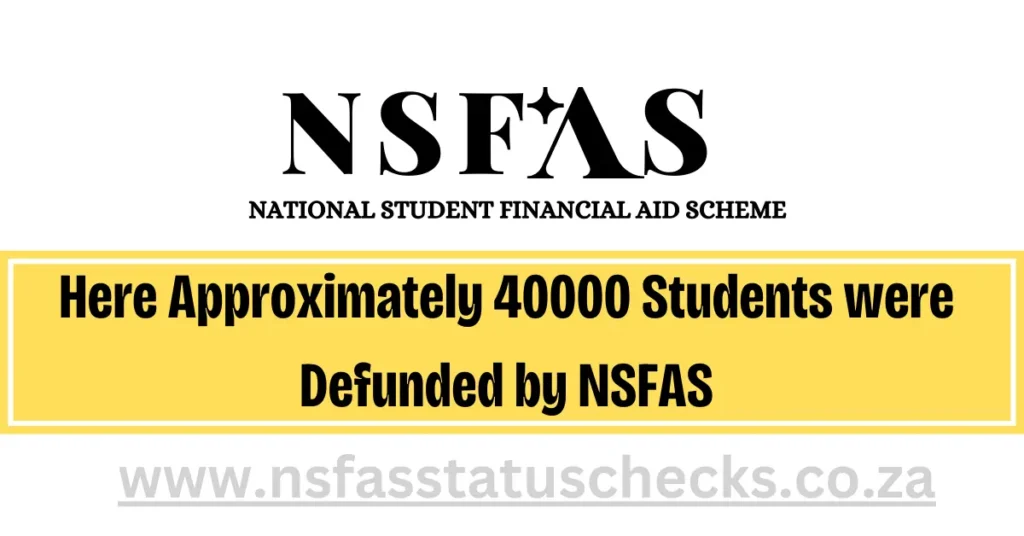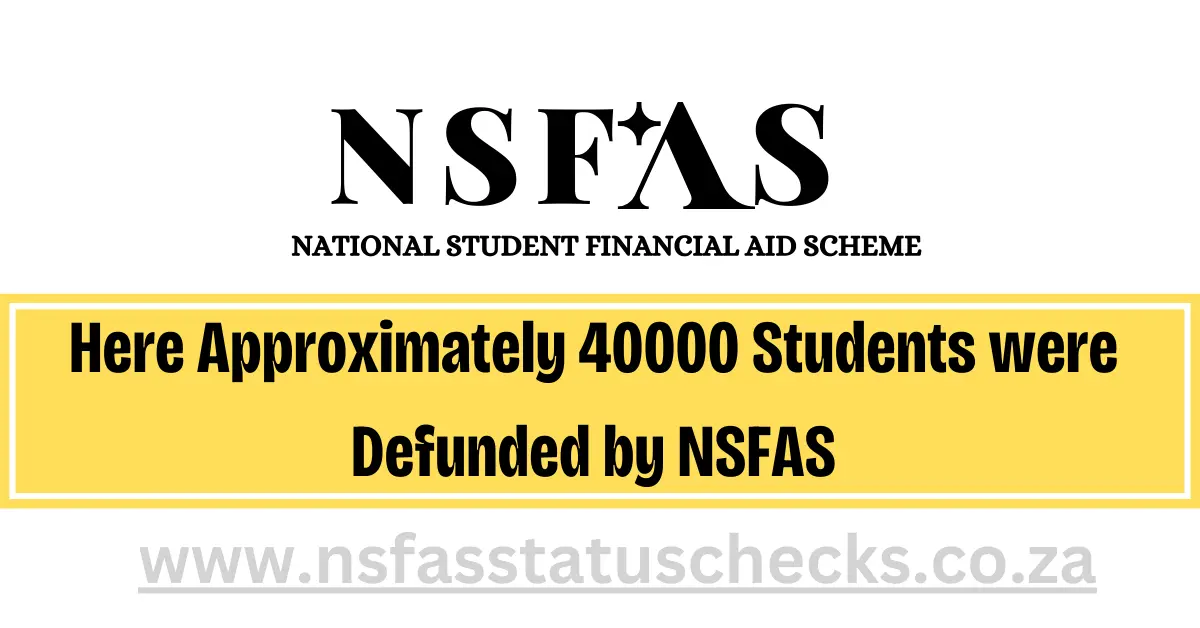Recent developments in the National Student Financial Aid Scheme (NSFAS) have sent shockwaves through the South African higher education landscape. Reports indicate that approximately 40,000 students have been defunded by NSFAS, leading to widespread concerns about the accessibility of education for financially disadvantaged students. This blog post aims to explore the reasons behind these funding changes, the implications for affected students, and potential solutions to address the challenges that have emerged.

Students Defunded by NSFAS
We must first understand what NSFAS does in order to provide financial assistance to students pursuing higher education. The NSFAS supports financially disadvantaged students in their pursuit of tertiary education, ensuring that they are given equal access to education. However, recent decisions to defund a significant number of students have raised questions about the criteria and processes involved in such determinations.
Reasons Behind Defunding
The reasons behind the defunding of approximately 40,000 students by NSFAS are multifaceted. One primary factor is the need for NSFAS to manage its budget effectively and allocate resources where they are most needed. Changes in economic conditions, shifts in government priorities, and an increasing number of eligible applicants may have contributed to the need for recalibration in funding distribution.
Impact on Affected Students
The defunding of approximately 40,000 students undoubtedly has a profound impact on those directly affected. It raises concerns about their ability to continue their education, complete their degrees, and pursue their career aspirations. This sudden change in financial support can create barriers to access, leading to disruptions in academic progress and increased stress and uncertainty among students.
NSFAS Communication and Transparency
One critical aspect in mitigating the impact of defunding is effective communication and transparency from NSFAS. Clear communication regarding the reasons behind the defunding decisions, avenues for appeal, and available support services can help students navigate the challenges they face. Students and the broader educational community benefit from transparency in the decision-making process.
Addressing Discrepancies and Inconsistencies
As the news of defunding unfolds, it’s essential for NSFAS to address any discrepancies or inconsistencies in the decision-making process. Ensuring that the criteria for defunding are applied consistently and fairly is crucial to maintaining the integrity of the financial aid system. This may involve a thorough review of individual cases and providing clear guidelines for affected students to follow.
Alternatives for Affected Students
In the face of defunding, affected students may need to explore alternative funding sources to continue their education. This could include seeking scholarships, part-time employment, or considering community-based initiatives that support students facing financial challenges. Educational institutions may also play a role in identifying additional support mechanisms for affected students.
Advocacy for Policy Changes
The defunding of a significant number of students highlights the need for ongoing advocacy for policy changes in the realm of higher education funding. Advocacy efforts can focus on addressing systemic issues, increasing overall funding for financial aid, and ensuring that the criteria for eligibility are fair, transparent, and considerate of diverse circumstances.
The Role of the Community in Support
Communities, both local and virtual, can play a crucial role in supporting affected students. Establishing support networks, sharing information about available resources, and advocating for the importance of accessible education can contribute to a collective effort in mitigating the challenges faced by those who have been defunded.
Addressing Immediate Concerns: Support Measures for Defunded Students
In the wake of the NSFAS defunding decisions, it is crucial to address the immediate concerns of affected students. Recognizing the urgency of the situation, educational institutions and relevant authorities can implement support measures to assist these students during this challenging period.
Emergency Financial Assistance
One immediate measure could involve the establishment of emergency financial assistance programs. These programs could offer short-term relief to cover essential expenses such as tuition fees, accommodation, and textbooks. In order for these emergency assistance efforts to be successful, businesses, philanthropic organizations, and government initiatives may collaborate with each other.
Mental Health and Counseling Services
The emotional toll on defunded students should not be underestimated. Universities and colleges can enhance their mental health and counseling services to provide emotional support, coping strategies, and resources to help students navigate the stress and uncertainty caused by the sudden change in their financial situation.
Engaging with Student Representatives
Engaging with student representatives and organizations is vital to understanding the specific challenges faced by defunded students. Student leaders can act as advocates, voicing the concerns of their peers and collaborating with educational institutions and NSFAS to find solutions and alternatives.
Workshops on Financial Literacy
To empower defunded students to navigate their changed circumstances, educational institutions can organize workshops on financial literacy. These workshops can provide valuable insights into budgeting, managing expenses, and seeking alternative sources of funding. Equipping students with financial literacy skills can enhance their ability to make informed decisions during challenging times.
Long-Term Solutions: Collaborative Efforts for Systemic Change
While addressing immediate concerns is crucial, the focus should also extend to long-term solutions that contribute to systemic change within the higher education funding landscape.
Advocacy for Increased Funding
Advocacy efforts at both grassroots and policy levels can play a pivotal role in addressing the broader issue of insufficient funding for higher education. Students, educators, and community members can unite to advocate for increased government funding, ensuring that NSFAS has the necessary resources to support all eligible students adequately.
Policy Revisions and Flexibility
Advocating for policy revisions that introduce flexibility in the NSFAS eligibility criteria is essential. Policies that consider various socio-economic factors, changes in family circumstances, and unforeseen events can contribute to a more inclusive and responsive financial aid system.
Strengthening the Appeals Process
The recent defunding decisions underscore the importance of an effective and transparent appeals process. Strengthening this process, ensuring clear communication about appeal criteria, and streamlining the review process can enhance the fairness of funding decisions and reduce the likelihood of defunding situations.
Collaboration with Educational Institutions
Collaboration between NSFAS and educational institutions is crucial in addressing the challenges faced by defunded students. Regular communication, joint workshops, and a shared commitment to supporting students can contribute to a more cohesive and responsive higher education system.
Conclusion
The defunding of approximately 40,000 students by NSFAS raises critical questions about the accessibility of education for financially disadvantaged students in South Africa. While the reasons behind the defunding decisions may be rooted in budget constraints and recalibrations, the impact on affected students cannot be understated. As the higher education community navigates these challenges, transparency, effective communication, and advocacy for policy changes will be essential in ensuring that every deserving student has the opportunity to pursue their educational goals.
FAQs – Students Defunded by NSFAS
Can defunded students reapply for NSFAS funding?
Yes, defunded students typically have the option to reapply for NSFAS funding in subsequent application cycles, subject to meeting eligibility criteria.
What documentation is required for NSFAS appeal in cases of defunding?
NSFAS appeal documentation may include updated proof of income, academic records, and any relevant information addressing the reasons for defunding.
Are there community-based initiatives to support defunded students?
Local communities often have initiatives, charities, or organizations that provide support to students facing financial challenges. Students can explore these options for additional assistance.
How can affected students stay informed about updates and support services?
NSFAS typically communicates updates through its official channels, including the website and online portal. The best way to stay up-to-date with the latest information is to regularly check these sources.
Are there specific resoaurces available to defunded students for emergency financial assistance?
Some universities and colleges may have emergency funds or resources designated to assist students facing financial crises. Students should contact their institutions’ financial aid offices for information regarding financial aid.
Can defunded students appeal for emergency financial assistance directly with NSFAS?
While NSFAS primarily handles appeals related to funding decisions, defunded students should communicate directly with their educational institution’s financial aid office for immediate assistance.
How can students engage with local businesses or philanthropic organizations for support?
Students can explore partnerships with local businesses or philanthropic organizations through collaboration with their educational institution’s student services or community outreach programs.
Are there initiatives promoting mental health awareness within higher education institutions?
Many universities and colleges have mental health awareness initiatives and counseling services. Students can access these resources through their institution’s health and wellness centers.
What role can student representatives play in advocating for policy changes within NSFAS?
Student representatives can act as advocates by voicing the concerns of their peers, organizing awareness campaigns, and engaging in dialogue with NSFAS and educational institutions to drive positive changes in policies.
